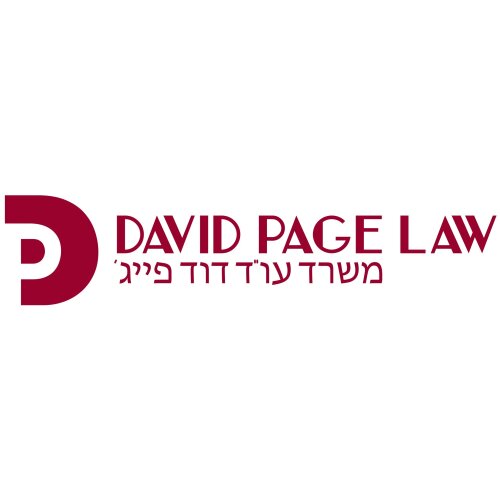Best Probate Lawyers in Israel
Share your needs with us, get contacted by law firms.
Free. Takes 2 min.
Or refine your search by selecting a city:
List of the best lawyers in Israel
About Probate Law in Israel
Probate law in Israel governs the legal process by which the assets of a deceased person are distributed to heirs or beneficiaries. This process ensures that the deceased’s debts are paid and the remaining assets are allocated according to the will, or if no will exists, according to Israeli succession law. Probate typically involves validating the will, appointing an executor, and ensuring that the decedent's wishes are honored.
Why You May Need a Lawyer
There are several situations where legal assistance in probate may be required in Israel:
- If there is a dispute among heirs or beneficiaries over the distribution of the estate.
- When the deceased’s will is unclear or contested.
- If the estate involves complex assets such as businesses or properties abroad.
- In cases where the estate has significant debts or tax obligations.
- If you are unfamiliar with the legal processes involved in probate and need guidance to ensure it is carried out correctly.
Local Laws Overview
Key aspects of probate law in Israel include:
- Succession Law, 1965: The primary legislation governing inheritance, detailing how assets are distributed in the absence of a will.
- Wills: Types of wills recognized under Israeli law include handwritten, witnessed, and oral wills under specific circumstances.
- Probate Orders: Required for the distribution of assets when a valid will exists.
- Inheritance Orders: Necessary when there is no will, these orders are issued by the Israeli Registrar of Inheritance.
- International Aspects: Consideration of foreign wills and estates with assets in multiple jurisdictions.
Frequently Asked Questions
What is probate?
Probate is the legal process of administering a deceased person's estate, including validating their will, if one exists, and distributing their assets.
Do I need a probate order if there is a will?
Yes, a probate order is necessary to execute the will and legally distribute the estate's assets according to the deceased's wishes.
What happens if there is no will?
If no will exists, the estate is distributed according to Israel's Succession Law, which outlines a hierarchy of heirs such as the spouse and children.
Can an executor of a will act without probate?
No, the executor must obtain a probate order to have the legal authority to manage and distribute the estate.
How long does the probate process take in Israel?
The length of the probate process can vary based on the estate's complexity and whether there are any disputes, generally ranging from a few months to over a year.
Can a will be contested in Israel?
Yes, beneficiaries or interested parties can contest a will on various grounds, such as undue influence or lack of capacity.
What taxes are applicable on inheritance in Israel?
There is no inheritance tax in Israel, but there may be other related taxes such as capital gains tax on certain assets.
What role does the Israeli Registrar of Inheritance play?
The Registrar issues probate and inheritance orders and manages disputes related to these orders.
Can foreign nationals inherit property in Israel?
Yes, foreign nationals can inherit property in Israel, but there may be additional legal and tax implications to consider.
How can I find out if there is an existing will?
Inquiries regarding existing wills can be made through the Registrar of Inheritance or by contacting the deceased's attorney.
Additional Resources
Here are some resources and organizations that can assist with probate matters in Israel:
- Israeli Bar Association: Offers legal advice and can help in finding a specialized probate lawyer.
- Registrar of Inheritance: The official body responsible for granting probate and inheritance orders.
- Ministry of Justice: Provides information on legal procedures related to inheritance and probate.
- Legal Aid Clinics: Some universities and non-profit organizations offer clinics for free or low-cost legal assistance.
Next Steps
If you need legal assistance in probate matters, consider the following steps:
- Consult with a Lawyer: Contact a lawyer specializing in probate law to guide you through the legal processes involved.
- Gather Necessary Documents: Compile all relevant documents, such as death certificates, the deceased's will, and asset lists.
- File an Application: Submit the necessary applications to the Registrar of Inheritance for probate or inheritance orders.
- Address Debts and Taxes: Ensure the estate's debts and any tax obligations are addressed promptly.
- Communicate with Heirs: Maintain open communication with all potential heirs to minimize disputes and ensure a smooth distribution process.
Lawzana helps you find the best lawyers and law firms in Israel through a curated and pre-screened list of qualified legal professionals. Our platform offers rankings and detailed profiles of attorneys and law firms, allowing you to compare based on practice areas, including Probate, experience, and client feedback.
Each profile includes a description of the firm's areas of practice, client reviews, team members and partners, year of establishment, spoken languages, office locations, contact information, social media presence, and any published articles or resources. Most firms on our platform speak English and are experienced in both local and international legal matters.
Get a quote from top-rated law firms in Israel — quickly, securely, and without unnecessary hassle.
Disclaimer:
The information provided on this page is for general informational purposes only and does not constitute legal advice. While we strive to ensure the accuracy and relevance of the content, legal information may change over time, and interpretations of the law can vary. You should always consult with a qualified legal professional for advice specific to your situation.
We disclaim all liability for actions taken or not taken based on the content of this page. If you believe any information is incorrect or outdated, please contact us, and we will review and update it where appropriate.
Browse probate law firms by city in Israel
Refine your search by selecting a city.
















